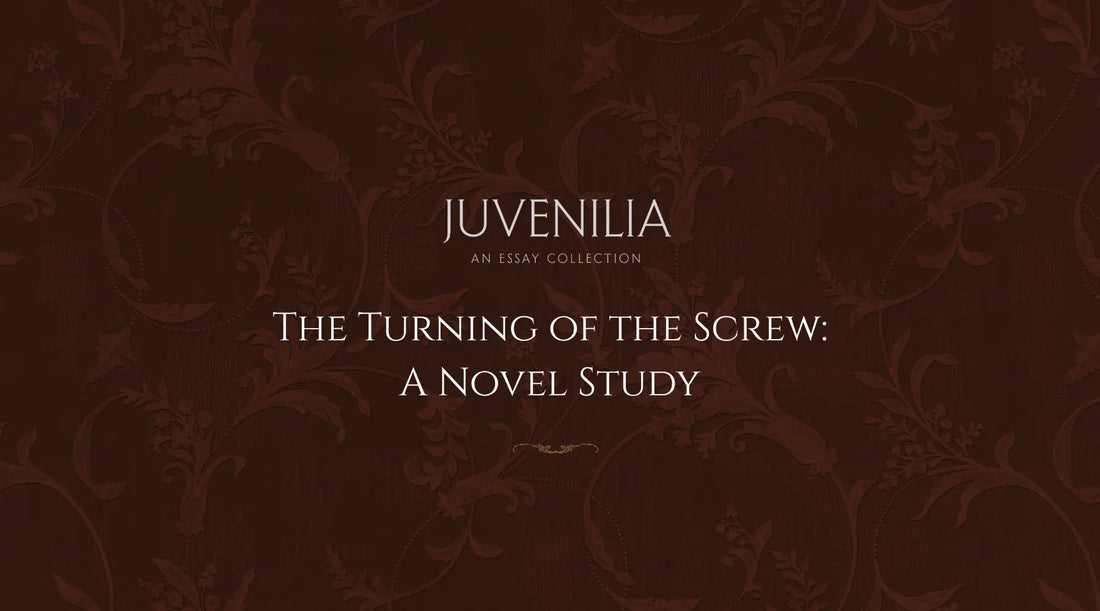
The Turning of the Screw - A Novel Study
In "The Turning of the Screw" by Henry James, the role of Miss Jessel, while not seemingly significant, is actually quintessential to the entire plot in conjunction with Peter Quint. Miss Jessel makes the governess an unreliable narrator; she is seemingly the only person who sees the apparitions as Mrs. Grose denies seeing the ghost and Flora gives no hint of seeing it.
In the Governess's mind, Miss Jessel is trying to steal Flora's soul, so the role of Miss Jessel aids in making the Governess a more maternal figure and proves her worthiness as a guardian, or unworthiness as the ending with Flora proves. Finally, Miss Jessel serves as a warning to the Governess's fate. Both Miss Jessel and the Governess are described as young and beautiful, and both had the role of caretaker for the children Miles and Flora. Both Miss Jessel and Peter Quint are described as "infamous" and "too familiar" with the children, something that we see plainly from the Governess.
Regardless of the reality of the situation, Miss Jessel's presence alone makes us skeptical about whether or not the Governess can be relied on as no one else seems to be able to see the apparition of the late Governess. From the start, we see the current Governess has an infatuation about learning more about the Uncle, and further, about the types of people he employs, namely, Miss Jessel (James, 32). Miss Jessel too was young and beautiful. The Governess confides in Mrs. Grose, another employee, who knew the predecessor and attempts to glean everything she can about the situation.
Miss Jessel isn't even alive anymore, and she is still managing to unhinge the narrator. What we learn is that Miss Jessel was described as infamous. When the Governess is out with Flora, the girl in her care, the Governess sees who she assumes is Miss Jessel, standing across the pond watching them (73). The governess has already encountered Peter Quint, who seems to have nefarious intentions, and she assumes as much of Miss Jessel as well. When the Governess looks to Flora to see if she noticed, it appears to the Governess that Flora pretended not to notice. It never occurs to the Governess that perhaps the child truly didn't see the ghost of Miss Jessel. In addition, Mrs. Grose never sees the ghost either and she serves as the voice of reason to the Governess, though it doesn't seem to do any good (177).
The Governess believes Miss Jessel is trying to steal Flora's soul and this gives the Governess purpose and kicks her maternal instincts into gear to protect the children. Miss Jessel does not get much screen time, but despite this, the threat of her presence is enough to invoke fear in the Governess. In the Governess's pursuit to protect Flora, it is she who actually frightens Flora to the point that the Governess herself becomes the "evil" thing, not Miss Jessel.
Flora disappears for a time, something that the Governess can't believe she allowed herself to do, and she comes to the worst conclusion: Flora left with Miss Jessel, and Miles (Flora’s elder brother) was in corroboration with Flora to keep her occupied. She deflects all blame towards Miss Jessel, refusing to take accountability for her own negligence and blames Miles for having aided in the matter (168). She goes in pursuit of Flora, who took the boat, crossed the water, and promptly hid the boat. This seems a curious thing to do, but children do curious things, especially if they're being led by a ghost, and though this seems unlikely, it's what the Governess believes. The Governess, when she finds Flora, frightens the child to the point of ruining all trust between them, and Mrs. Grose has to take her away (181). In addition, in trying to protect the children, she scares one away permanently, and the other dies in her arms.
Finally, Miss Jessel serves as a warning to the Governess. Miss Jessel, the late Governess, is everything that the current one starts off as. Young and beautiful, and in charge of the children. Miss Jessel and Peter Quint, after having their charges, are described as "infamous" and from the very start, the Governess is infatuated with her predecessors. She assaults Mrs. Grose with questions about Miss Jessel and Peter Quint, and slowly harasses to the point that she learns everything she can. Due to the fact that all of this takes place through the Governess herself, it does not come across so problematic because she herself does not see it as problematic, but at face value, she seems to be quite a bully.
The Governess is also overly fond of the children, arguably to a fault as she feels it okay to hug and kiss both children almost out of the gate. We do not know what happened to Miss Jessel when she died, but if in life she was young and beautiful, in death she is described as miserable, pale, and dreadful. Due to the undeniable tie between the characters, the parallelism of the characters, the fact that one has a sinister end can't help but allude to a potentially sinister end in the Governess too, especially as the story ends with Miles dying in her arms. Although the story is left quite unanswered, a child dying in yours arms, one that you're to protect no less, has to leave a stain.
The role of Miss Jessel, while menial, has a lot of significance in destroying the main character. Although Miss Jessel's presence is spoken of only twice, she is constantly in the Governess's thoughts. Miss Jessel unhinges the Governess to the point that the Governess herself becomes the villain. Miss Jessel is supposedly trying to steal Flora’s soul, and she serves as a warning to a potentially sinister fate for the Governess, which unfortunately goes unheeded.
[WORKS CITED]
James, Henry. The Turn of the Screw. ebook ed., The Floating Press, 2009.
